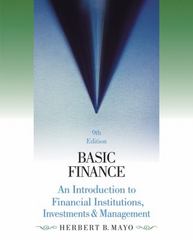Question
You just received a job offer from a big investment bank in Chicago and are thinking of buying a new car. The lease is for
You just received a job offer from a big investment bank in Chicago and are thinking of buying a new car. The lease is for 60 months. The financing information is as follows: The cost of purchasing the car is $35,000 Buyers must also pay a destination charge of $525, but lessees have no destination charge. There is a $900 acquisition fee paid by the lessee at the beginning of the lease. There is a $800 security deposit for the lessee at the beginning of the lease. o This fee is refunded at the end of the lease. The lease residual value at the end of 5 years is $18,000. o If the true value is less than this, you must pay the difference. o If the true value is greater than this, you do not receive anything. You believe the value of the car will be worth $16,500 at the end of the lease. The monthly lease payments are $450 a month for 60 months. a. What is the monthly IRR and annual IRR of buying versus leasing? [10 points] b. Given a discount rate of 9%, what is the NPV of buying versus leasing? Should you buy or lease? [5 points] c. As your estimated residual value increases from 15,000 to 23,000, how does the IRR and NPV of buying versus leasing change? [5 points] d. Explain why this pattern makes economic sense. [5 points]
Step by Step Solution
There are 3 Steps involved in it
Step: 1

Get Instant Access to Expert-Tailored Solutions
See step-by-step solutions with expert insights and AI powered tools for academic success
Step: 2

Step: 3

Ace Your Homework with AI
Get the answers you need in no time with our AI-driven, step-by-step assistance
Get Started


